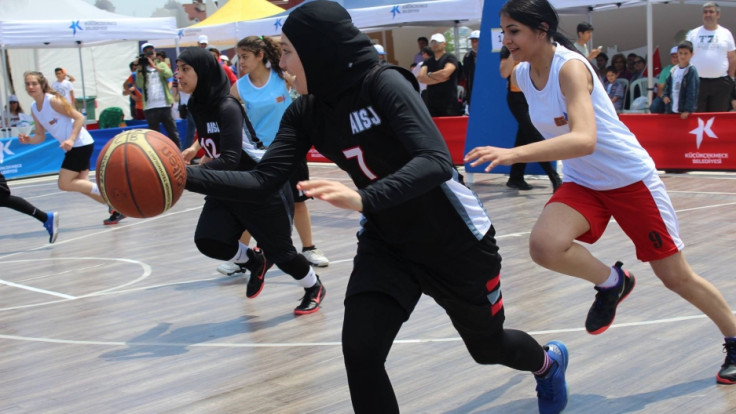International Basketball Federation to rule on whether Muslim players can wear hijabs
Hijab ban is 'not ok and it's time for a change' says player Indira Kaljo.

Hijabs meet hoops this month as the International Basketball Association decides whether or not female Muslim athletes will be allowed to wear hijabs in official competition games.
It's difficult enough for Muslim women to play sports, and the head-covering ban in many international competitions makes it even harder. Lifting the basketball ban on head coverings would be a monumental change for Muslim women.
Players can currently wear hijabs (and turbans) in some competitions as part of a two-testing programme that Fiba (the Federation Internationale de Basketball) agreed to beginning in 2014. The sports governing body will issue its final decision on the matter likely sometime after the Rio Olympics.
The basketball federation has long prohibited the use of headgear and hair accessories in basketball and ruled that "all equipment used by players must be appropriate for the game." The only exception was a 5cm headband to control hair and sweat.
Fiba has claimed it is a safety issue and detracts from team uniformity. One concern is that a hijab could slip down around the neck and could be pulled, causing injury to the neck or cause a player to choke — though a Velcro "tear-way" hijab could solve the problem.
Another concern is overheating for Muslim female athletes who not only have to cover their head but their legs and arms as well.
Kuwait launched a major challenge to the rule in 2009 after a 16-year-old player wearing a hijab was barred from playing in the Asian Youth Games.
"I think the rules should be changed," Kuwait coach Yousef Khaled said at the time. "It's just a scarf and it doesn't affect the players."
"Even in the Olympics, women that wear hijab are not allowed to compete, and to me this is just outrageous," Bosnian-American Muslim player Indira Kaljo told the Global Post. "It's not ok and it's time for a change."
Kaljo, who began wearing a hijab later in life, found her opportunities shrank when she put on the head covering.
"I was the same basketball player, but due to having a hijab on I was no longer even sought out, I was no longer even asked to play because I decided to represent my faith," Kaljo said.
She is currently playing for Jeddah United in Saudi Arabia because the team does not operate under Fiba's rules. But she is also fighting hard to change international rules on hijabs.
Muslim basketball players are banding together for the #fibaALLOWhijab cause - https://t.co/t4e0BhxIqO pic.twitter.com/GmIhJKHMCH
— Ummah Sports (@UmmahSports) July 19, 2016
An online campaign to influence Fiba by Kaljo and others has generated more than 70,000 signatures on Change.org and lots of comments on #fibaALLOWhijab.
America's National Collegiate Athletic Association (NCAA) allows women to play in headscarves, but not the full hijab, saying the rule is meant to protect other players from injury.
© Copyright IBTimes 2025. All rights reserved.






















